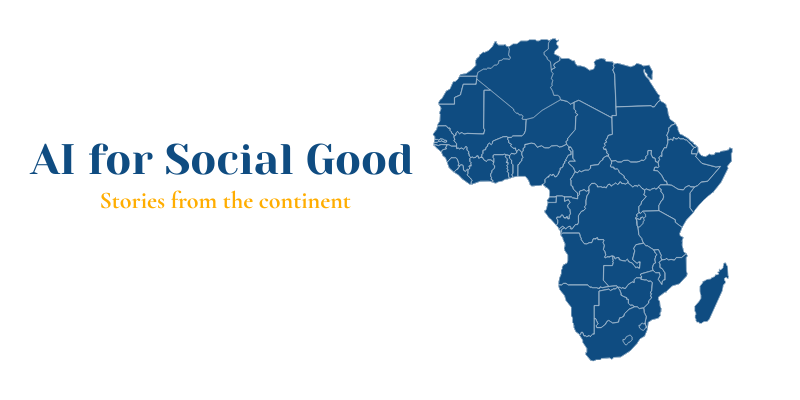AI for Social Good: Stories from the Continent
In the dawn of AI breakthroughs and billion-dollar valuations, one narrative often escapes the global spotlight: how Africans are using AI not just for profit, but for purpose.
Across the continent, changemakers are merging artificial intelligence with empathy, culture, and context, solving problems that traditional systems have long ignored or under-resourced. From diagnosing diseases to predicting droughts, AI is being adapted to suit local African contexts, languages, cultures, data realities, and infrastructure in innovative ways that reflect Africa’s unique challenges and extraordinary potential.
Let’s take a journey through some of these remarkable stories.
Diagnosing Diseases in Rural Clinics – Nigeria
In Nigeria, startups like MDAAS Global and health tech platforms are using AI-driven diagnostics to provide faster, cheaper, and more accurate medical testing in underserved areas. AI tools analyse patient symptoms and lab data to flag early signs of chronic diseases, empowering health workers who may not have access to specialist doctors.
Why it matters: In places where one doctor serves thousands, AI can serve as a second brain, saving time, costs, and lives.
Smart Farming & Crop Predictions – Kenya and Ghana
In East and West Africa, AI-powered platforms like UjuziKilimo (Kenya) and Esoko (Ghana) are helping farmers improve yields. These tools use satellite data and machine learning to forecast rainfall, identify soil deficiencies, and suggest optimal planting seasons.
Why it matters: With climate change disrupting traditional farming patterns, AI is becoming a quiet agricultural ally.
Bridging Educational Gaps – South Africa
South African edtech company Ubongo and chatbot-based platforms are leveraging AI to deliver personalised, multilingual content to students in schools in marginalised communities. Some bots even adapt their learning pace and style to each child’s performance.
Why it matters: In a continent where teacher shortages are common, AI can supplement learning, making education more accessible and inclusive.
Tracking Human Rights Violations – Cameroon & Sudan
AI is also being used to uphold justice. In conflict zones like Cameroon and Sudan, image recognition tools and satellite surveillance help identify burned villages or illegal detentions. Organisations like Amnesty International and Global Rights are integrating AI into their advocacy work.
Why it matters: When traditional media is silenced, AI can serve as a witness.
The Rise of Local AI Ecosystems
From Data Science Nigeria to Zindi Africa, local ecosystems are training the next generation of African AI talent. These platforms host competitions and bootcamps that encourage young Africans to solve problems using real-world data, from predicting power outages to improving traffic systems.
Why it matters: Empowering local AI talent ensures the technology serves local realities, not just imported frameworks.
Final Thoughts
While debates rage globally about AI replacing jobs or threatening privacy, on the African continent, AI’s narrative is refreshingly human. It’s about reaching the unreached and amplifying local voices and filling systemic gaps.
But we must remain vigilant. These tools must be built ethically, inclusively, and in partnership with the communities they aim to serve.
The question isn’t whether AI will shape Africa’s future.
The question is: Who will build it, and who will benefit?
Let’s make sure the answer includes all of us.
References
State of AI in Africa Report 2023
https://cipit.strathmore.edu/wp-content/uploads/2023/12/Final-Report-The-State-of-AI-in-Africa-Report-2023-3.pdfchrome-extension://efaidnbmnnnibpcajpcglclefindmkaj/https://cipit.strathmore.edu/wp-content/uploads/2023/12/Final-Report-The-State-of-AI-in-Africa-Report-2023-3.pdf
Detailed analysis of how AI is impacting sectors across African countries, plus data on ecosystem growthHow AI Is Revolutionising Healthcare in Africa
https://www.weforum.org/publications/centre-for-the-fourth-industrial-revolution-network-2023-2024-impact-report/
Features case studies from Nigeria and Rwanda.MDaaS Global – Building Africa’s Clinical Infrastructure
https://www.mdaas.io/
Example of a well-adapted AI-powered diagnostic system in Nigeria.UjuziKilimo (Kenya) and Esoko (Ghana)
https://www.ujuzi.africa/
https://esoko.com/Two major agri-tech platforms use AI and data analytics for soil and weather intelligence.
Ubongo – Africa’s Leading Edutainment Company
https://www.ubongo.org/Though not exclusively AI-based, they are exploring adaptive learning powered by machine learning for children across Africa.
AI and Education in Africa
https://iafrica.com/revolutionizing-education-how-ai-powered-platforms-are-transforming-learning-in-africa/#:~:text=Similarly%2C%20Ubongo%2C%20a%20pan%2D,is%20a%20masterclass%20in%20scalability.
Discusses AI tools improving education outcomes in underserved communities.Decoding Conflict with AI: How Amnesty International Is Using Tech to Protect Human Rights
https://www.humanrightsresearch.org/post/harnessing-technology-to-safeguard-human-rights-ai-big-data-and-accountability#:~:text=Organizations%20like%20Amnesty%20International%20use,%2C%20algorithmic%20bias%2C%20and%20censorship. Covers the use of machine learning to detect human rights violations in Sudan and Cameroon.AI for Peace and Justice in Africa
https://ict4peace.org/what-we-do/#ict-for-peaceful-purposes
Explores digital tools, including AI, in promoting peacebuilding in African conflict regions.Data Science Nigeria
https://www.datasciencenigeria.org/One of Africa’s leading AI education and research nonprofits, offering bootcamps and AI competitions.
Zindi – Africa’s Data Science Community
https://zindi.africaAI competitions focused on solving real African problems with data.

